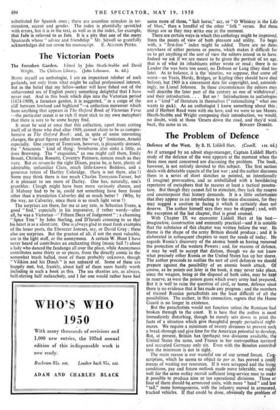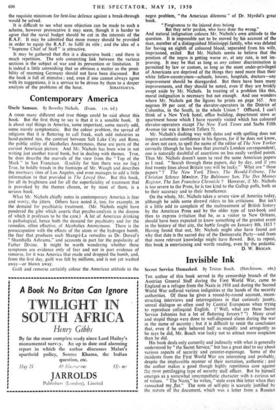The Problem of Defence
Defence of the West. By B. H. Liddell Hart. (Cassell. a 25. 6d.) As if arranged by an adroit stage-manager, Captain Liddell Hart's study of the defence of the west appears at the moment when the three men most concerned are discussing the problem. The book, however, is not entirely devoted to this subject. The first section deals with debatable aspects of the last war ; and the author discusses them in a series of short sketches so pointed, so intentionally (I imagine) provocative, and so embellished with a bewildering repertoire of metaphors that he secures at least a tactical penetra- tion. But though they cannot fail to stimulate, they lack the reserve and counterpoint that history demands. It is a little unfortunate that they appear as an introduction to the main discussion, for they may suggest a caution in facing it which it certainly does not deserve. The author himself says they may be skipped ; and, with the exception of the last chapter, that is good counsel.
With Chapter IX we encounter Liddell Hart at his best— imaginative, constructive and eminently practical—and it is notable that the substance of this chapter was written before the war. Its theme is the shape of the army Britain should produce ; and it is elaborated in subsequent chapters to meet the needs of today. He regards Russia's discovery of the atomic bomb as having removed the protection of the western Powers ; and, for reasons of defence, it may be well to accept that dictum, though we do not know what precisely either Russia or the United States has up her sleeve. The author proceeds to outline the sort of civil defences we should prepare against the possibility of an atomic bomb attack. Of course, as he points out later in the book, it may never take place, since the weapon, being at the disposal of both sides, may be kept in reserve, as were the poison gases which every army had prepared. But it is well to raise the question of civil, or home, defence since there is no evidence that it has made any progress ; and the numbers of trained Russian parachutists are the least difficult of all the possibilities. The author, in this connection, regrets that the Home Guard is no longer in existence. But the parachutists would not function unless the Russians- had broken through to the coast. It is here that the author is most immediately disturbing, though he merely sets down in print the facts of a situation which give thoughtful people periodical night- mares. We require a minimum of twenty divisions to prevent sueh. a break-through and give time for the American potential to develop( But, at present, Britain has (perhaps) two divisions available, th United States the same, and France in her metropolitan territo and occupied Germany only six. Even with the Benelux contrib tion the minimum is not in sight.
The main reason is our wasteful use of our armed forces. Coll scription, which he seems to object to per se, has proved a coma, means of wasting our resources. If it were scrapped and the living conditions, pay and future outlook made more tolerable, we might well for the same outlay recruit sufficient long-service men to make it possible to produce nine or ten operational divisions. Three or four of them should be armoured units, with more " head " and lesi "tail," more homogeneous, with' the infantry moved in armoured, tracked vehicles. If that could be done, obviously the problem of •
the requisite minimum for first-line defence against a break-through would be solved.
It is difficult to see what sane objection can be made to such a scheme, however provocative it may seem, though it is harder to agree that the naval budget should be cut in the interests of the R.A.F. It may be admitted that more money should be provided in order to equip the R.A.F. to fulfil its role ; and the idea of a " Supreme Chief of Staff " is attractive.
It may be gathered that this is a discursive bobk ; and there is much repetition. The sole connecting link between the various sections is the subject of war and its prevention or limitation. It is indeed a little astonishing that so obvious a matter as the possi- bility of rearming Germany should not have been discussed. But the book is full of stimulus ; and, even if one cannot always agree with its suggestions, it is a service to be driven by them to a deeper analysis of the problems of the hour. STRATEGICUS.











































 Previous page
Previous page